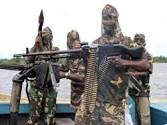
Long after the last militant has been annihilated and the final suicide bomb exploded, the effects of Boko Haram’s terror tactics in Nigeria’s north-east will still be seen and felt. And not just in the bodies maimed or the properties razed or the offspring of rape.
The insurgents are leaving behind in some communities a dense cloud of internecine hatred and suspicion.
Last month, I travelled to Michika on a mission organised by the Adamawa Peace Initiative (API), an interfaith attempt to reduce violence and build peace through a collaboration of local religious, community and business leaders.
Since 2012 it has been engaged in a number of joint peace-building programmes in the north-eastern state of Adamawa, working with the American University of Nigeria (AUN), and Michika is currently top of their list.
The town, one of the largest in the state, has a mixed Christian and Muslim population, with the former in the majority.
It borders Borno state, the heartland of the Boko Haram insurgency.
A divided community
Although tensions have always existed between the two religious groups, they have managed to live in peace.
“When we were fleeing Boko Haram,” one Christian woman in Michika recounted, “I saw two abandoned children who were about seven years old and took them with me to Yola. They were Muslim but it didn’t make any difference to me.”
But all that has changed.
Adaobi Tricia Nwaubani:
“The Christian and Muslim children exchange insults in the streets and in public transport, calling one another names and making hateful or snide remarks”
Boko Haram overran the town in September 2014. For the next seven months, Michika was part of the militants’ so-called caliphate, where they hoisted flags and defaced government signboards with Arabic inscriptions announcing the greatness of Allah.
After the Nigerian military liberated the town, the thousands who had fled gradually began to return.
But these days, the Christians and Muslims are at loggerheads.
“Because our Christian religion tells us to treat people well, the other side decided to take advantage of us,” said one Christian man.
While a Muslim woman complained: “I heard two women whispering about my hijab, then one of them asked me to tell them what I had hidden underneath.”
The Christian and Muslim children exchange insults in the streets and in public transport, calling one another names and making hateful or snide remarks.
The two religious groups now have separate market days – the most important day of the week in this agricultural community.
The Christians have chosen Saturday as their fixed big day for buying and selling produce from their farms, while the Muslims have theirs on Sundays – when the Christians are in church.
As a result, customers who used to come from far and wide to buy from Michika market now prefer to go elsewhere, leading to a further plunge in the fortunes of a town already economically devastated by the militants whose presence interrupted the yearly planting and harvesting cycle.
The different groups accuse each other of showing favouritism when relief materials donated by NGOs are being distributed, saying that who gets what, when and how is determined by the group to which the person in charge belongs.
With the poor agricultural output and the loss of other means of livelihood abandoned during the period of Boko Haram occupation, these relief materials are a major source of survival for the people.
“Christians in this town are in the majority so they deprive us of our rights,” a Muslim man said.
END

Be the first to comment